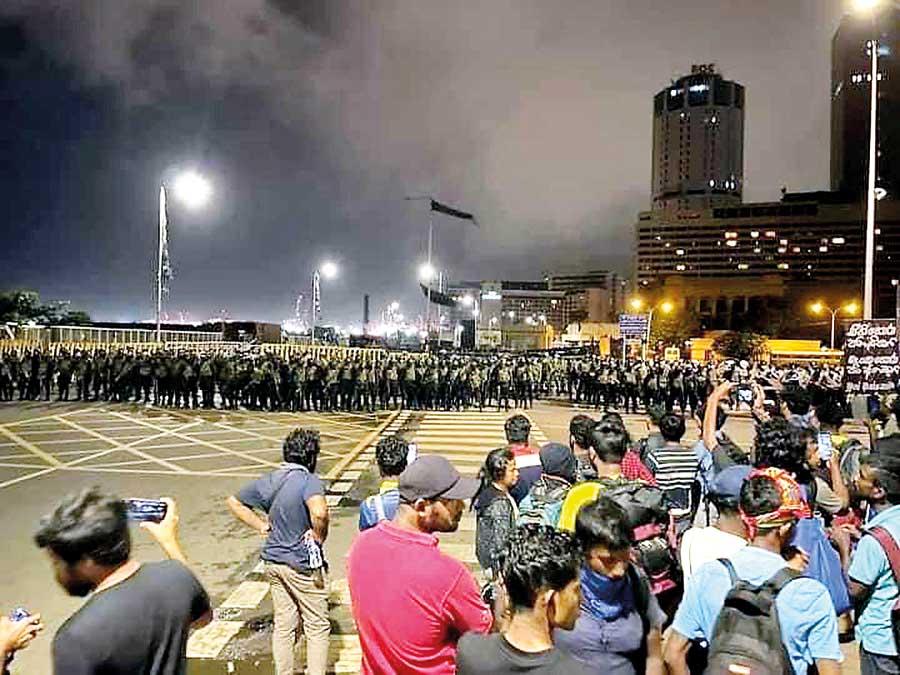07 Sep 2022 - {{hitsCtrl.values.hits}}

Recently, I had a long chat with a Sri Lankan colleague whose work I not only admire, but who is also someone with an unblemished work ethic.
with an unblemished work ethic.
He had returned to Sri Lanka when the Aragalaya (protests) erupted in earnest after being forced into exile. He spent over four months reporting on the protests and their impact.
“This was something completely different. This was not like reporting the war. However intense and dangerous that coverage was there was always that sense we could get away from that story, at least for a short time. There was no such escape, this story was everywhere, and it was seeping into our lives from every crevice, nook and corner. It was like the smell of a slow rotting caraccas, it just hung in the air,” he told me after he had returned from Sri Lanka.
"A few of the conversations I have had to engage with senior journalists have been on how unnecessary emotional safety is for journalists, they still seem to live and work in that false yet dangerous reality of the bullet-proof journalist. This was the attitude that made us report a war as if it was a cricket match, dehumanising the suffering and allowing for political hatchet jobs to sprout like moss after the rains"
His words have been echoed by every one of the journalists I have spoken to, except for the parachute foreign correspondents who flocked like vultures to the carcass and now have left. Even those who were not skilled enough to recognise the boundary between journalism and activism admit, may be unwittingly, that one reason that pushed them over that line was the unrelenting nature of the story. You did not have to chase this one, it kept coming at you from every nook and crevice.
The intensity was partly due to how we communicate now, the impact of the connected echo system which keeps bombarding us with facts and lies and everything in between every second.
"By dehumanising the stories, we dehumanised their impact on us. Instead of acknowledging the impact these stories were having on our lives and by extension on our journalism, we superimposed a veneer of objectivity and emotional detachment"
The impact on the media, especially, those reporting very closely was unmitigated because we have been slow to acknowledge and mitigate that very impact. I am in the process of putting together a training programme for Sri Lankan journalists on emotional wellbeing and safety. Unsurprisingly, a few of the conversations I have had to engage with senior journalists have been on how unnecessary emotional safety is for journalists. They still seem to live and work in that false yet dangerous reality of the bullet-proof journalist. This was the attitude that made us report a war as if it was a cricket match, dehumanising the suffering and allowing for political hatchet jobs to sprout like moss after the rains.
"Even those who were not skilled enough to recognise the boundary between journalism and activism admit, may be unwittingly, that one reason that pushed them over that line was the unrelenting nature of the story. You did not have to chase this one, it kept coming at you from every nook and crevice"
I am ever thankful that by chance, the only avenue that was open for me to get into even close to the seams of defence reporting was by writing stories on the humans caught in the war. They were used to be called, derogatively, human interest stories, as if the focus on human interest in itself undervalued the journalism in them.
By dehumanising the stories, we dehumanised their impact on us. Instead of acknowledging the impact these stories were having on our lives and by extension on our journalism, we superimposed a veneer of objectivity and emotional detachment. This was not only pretentious but also allowed for a culture of partisan political and racial reporting to be rampant.
Thankfully, some from the younger generation and a few from my own have realised this myth. They acknowledge that reporting the Aragalaya was difficult. But they are also willing to learn the skills of understanding the emotional impact and to mitigate them.
That change in attitude is a world away from the dinosaur like attitude of false objectivity that still lumber through editorials.
As much as we acknowledge the impact, we need to change our attitudes so that not only is our workspace safe but also out work is relatable to the world outside the editorials.
The writer is a journalism researcher. He can be contacted on [email protected]
10 Jan 2025 40 minute ago
10 Jan 2025 2 hours ago
10 Jan 2025 3 hours ago
10 Jan 2025 4 hours ago
10 Jan 2025 5 hours ago